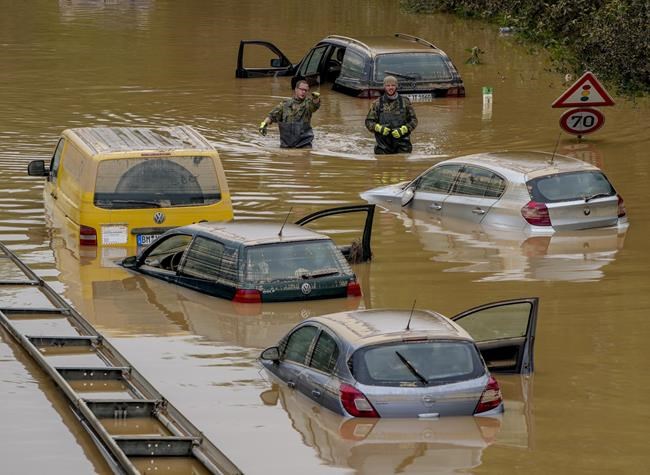Study: Climate change makes European flooding more likely
Advertisement
Read this article for free:
or
Already have an account? Log in here »
To continue reading, please subscribe:
Monthly Digital Subscription
$0 for the first 4 weeks*
- Enjoy unlimited reading on winnipegfreepress.com
- Read the E-Edition, our digital replica newspaper
- Access News Break, our award-winning app
- Play interactive puzzles
*No charge for 4 weeks then price increases to the regular rate of $19.00 plus GST every four weeks. Offer available to new and qualified returning subscribers only. Cancel any time.
Monthly Digital Subscription
$4.75/week*
- Enjoy unlimited reading on winnipegfreepress.com
- Read the E-Edition, our digital replica newspaper
- Access News Break, our award-winning app
- Play interactive puzzles
*Billed as $19 plus GST every four weeks. Cancel any time.
To continue reading, please subscribe:
Add Free Press access to your Brandon Sun subscription for only an additional
$1 for the first 4 weeks*
*Your next subscription payment will increase by $1.00 and you will be charged $16.99 plus GST for four weeks. After four weeks, your payment will increase to $23.99 plus GST every four weeks.
Read unlimited articles for free today:
or
Already have an account? Log in here »
Hey there, time traveller!
This article was published 23/08/2021 (1556 days ago), so information in it may no longer be current.
BERLIN (AP) — Scientists say that global warming makes the kind of extreme rainfall that caused deadly flash flooding in western Europe last month more likely, though it remains unclear exactly how much.
At least 220 people died in Germany and Belgium on July 14-15 when swollen streams turned into raging rivers, sweeping away houses, roads and bridges, and causing billions of euros (dollars) in damage.
A study released Tuesday by the World Weather Attribution group used historical records and computer simulations to examine how temperatures affected rainfall from the late 19th century to the present. While the study hasn’t been assessed by independent scientists yet, its authors use widely accepted methods to conduct rapid assessments of specific weather events such as floods, droughts and heat waves.

It found that across a large strip of western Europe — stretching from the Netherlands to Switzerland — the amount of rainfall in a single day increased by 3% to 19% over the period, during which global temperatures increased by 1.2 degrees Celsius (2.2 degrees Fahrenheit).
Experts say that for every 1 degree Celsius (1.8 F) the planet warms, the air can absorb 7% more water. When that water is released, it causes more extreme rainfall.
The study, conducted by almost 40 researchers from six European countries and the United States, calculated that downpours of the kind that caused last month’s floods are now 1.2 to 9 times more likely — and this will increase further if the planet continues to heat up.
Frank Kreienkamp of Germany’s nation weather service DWD, who co-wrote the study, said the findings supported forecasts in a recent U.N. climate report.
“Humans are clearly changing and warming up the Earth’s climate,” he said. “And with this warming we are also seeing a change in weather extremes.”
The authors said the damage and loss of life seen in this disaster highlight how nations need to do more to curb greenhouse gas emissions and prepare for such disasters.
“These floods have shown us that even developed countries are not safe from severe impacts of extreme weather that we have seen,” said Friederike Otto, associate director of the Environmental Change Institute at Oxford University. “This is an urgent global challenge and we need to step up to it. The science is clear and has been for years.”
___
Follow AP’s climate coverage at http://www.apnews.com/Climate

